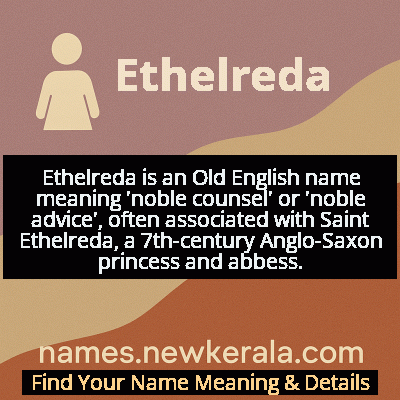Ethelreda Name Meaning & Details
Origin, Popularity, Numerology Analysis & Name Meaning of Ethelreda
Discover the origin, meaning, and cultural significance of the name ETHELREDA. Delve into its historical roots and explore the lasting impact it has had on communities and traditions.
Name
Ethelreda
Gender
Female
Origin
Christian
Lucky Number
6
Meaning of the Name - Ethelreda
Ethelreda is an Old English name meaning 'noble counsel' or 'noble advice', often associated with Saint Ethelreda, a 7th-century Anglo-Saxon princess and abbess.
Ethelreda - Complete Numerology Analysis
Your Numerology Number
Based on Pythagorean Numerology System
Ruling Planet
Venus
Positive Nature
Harmonious, responsible, caring, and artistic.
Negative Traits
Overly idealistic, superficial, possessive, or jealous.
Lucky Colours
Pink, turquoise.
Lucky Days
Friday.
Lucky Stones
Diamond, turquoise.
Harmony Numbers
2, 3, 9.
Best Suited Professions
Artists, musicians, teachers, healthcare workers.
What People Like About You
Warmth, nurturing nature, artistic flair.
Famous People Named Ethelreda
Saint Ethelreda
Anglo-Saxon saint and abbess
Founded Ely Abbey and became patron saint of Ely Cathedral
Ethelreda Malte
Tudor courtier
Recognized by Henry VIII and granted substantial properties
Ethelreda Janet Goode
British educator
Pioneering headmistress and women's education advocate
Name Variations & International Equivalents
Click on blue names to explore their detailed meanings. Gray names with will be available soon.
Cultural & Historical Significance
The cultural impact of Ethelreda extended beyond her lifetime through the widespread veneration that developed around her cult. Numerous churches across England were dedicated to her, and the popular fair known as 'St. Audrey's Fair' gave rise to the word 'tawdry' (from 'St. Audrey') when the quality of goods sold there declined. Most significantly, the evolution of her name into 'Audrey' represents one of the clearest examples of how Anglo-Saxon names were adapted and simplified over centuries, creating a direct linguistic bridge between early medieval England and the modern era. This transformation demonstrates how Ethelreda remained culturally relevant even as language and naming practices evolved.
Extended Personality Analysis
Those bearing the name Ethelreda are often characterized by a distinctive combination of traditional strength and refined sensibility. The name's meaning of 'noble maiden' suggests someone who carries themselves with natural dignity and grace, yet possesses an underlying resilience that enables them to withstand challenges without compromising their principles. Ethelredas typically exhibit strong moral convictions and a clear sense of right and wrong, often serving as moral compasses in their families or communities. They tend to be thoughtful rather than impulsive, considering decisions carefully and valuing wisdom over quick solutions.
In interpersonal relationships, Ethelredas often demonstrate remarkable loyalty and dedication to those they care about. Their 'noble' aspect manifests not as arrogance, but as a sense of responsibility toward others and a commitment to fairness and justice. Meanwhile, the 'maiden' quality suggests purity of intention, idealism, and sometimes a certain spiritual or philosophical depth. These individuals are frequently drawn to meaningful pursuits—whether in career, hobbies, or personal growth—and may have little patience for superficiality or trivial concerns. While they can appear reserved or traditional to outsiders, those who know them well appreciate their depth of character, dry wit, and the surprising strength that emerges when their principles or loved ones are threatened. Their combination of traditional values and inner fortitude makes them both anchors in times of crisis and inspiring examples of integrity in everyday life.
Modern Usage & Popularity
In contemporary naming practices, Ethelreda occupies a fascinating niche as a rare vintage name that appeals to parents seeking something both historically significant and distinctive. While it doesn't rank on official popularity charts in English-speaking countries, it enjoys periodic revivals among those with interests in Anglo-Saxon history, traditional English names, or Christian heritage. The name's connection to the much more popular 'Audrey' gives it an accessible quality, allowing parents to choose a unique name with a familiar, elegant sound. Modern usage tends to be most common in the United Kingdom, particularly in regions with historical ties to Saint Ethelreda such as Cambridgeshire and East Anglia. The name appeals to parents looking for alternatives to currently popular vintage names like Eleanor or Matilda, offering similar historical depth but greater distinctiveness. Its rarity ensures that a child named Ethelreda is unlikely to share her name with classmates, while its strong historical and linguistic roots provide a sense of substance and continuity that many modern parents value.
Symbolic & Spiritual Meanings
Ethelreda carries rich symbolic meaning that transcends its literal translation of 'noble maiden.' The name represents the ideal of using one's inherent advantages—whether of birth, talent, or circumstance—for higher purposes rather than personal gain. Symbolically, it embodies the concept of 'noble service,' where strength and privilege are directed toward spiritual growth, community benefit, or moral leadership. The combination of 'noble' and 'maiden' creates a powerful metaphor for integrity preserved—suggesting someone who maintains their principles and purity of purpose despite worldly temptations or challenges.
In a broader cultural context, Ethelreda symbolizes historical continuity and the living presence of the past in modern life. As a name that evolved into 'Audrey' while maintaining its original form in historical and religious contexts, it represents both change and permanence in cultural traditions. The name also carries symbolic weight as an example of female agency and spiritual authority from a historical period often perceived as dominated by male figures. For contemporary bearers, Ethelreda can symbolize balancing respect for tradition with personal authenticity, and finding one's strength in conviction rather than conformity. The name's connection to a saint who chose religious devotion over royal privilege adds layers of meaning about the relative value of spiritual versus worldly power, making it symbolically rich for those interested in names with philosophical or religious depth.

